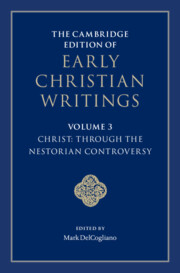Book contents
- The Cambridge Edition of Early Christian Writings
- The Cambridge Edition of Early Christian Writings
- The Cambridge Edition of Early Christian Writings
- Copyright page
- Contents
- Notes on Contributors
- Acknowledgments
- Note on the Texts and Translations
- Abbreviations
- Series Introduction
- Introduction
- Part I The Beginnings of Christology
- 1 Ascension of Isaiah 6–11 (Ethiopic Version)
- 2 The Gospel of Peter
- 3 The Epistle of the Apostles
- 4 The First Letter of Clement (Selections)
- 5 Ignatius of Antioch, Letters (Selections)
- 6 Epistle to Diognetus 1 and 7–12
- 7 Justin Martyr, First Apology 23, 30–32, 46, 63 and Second Apology 10, 13
- 8 Tatian, Address to the Greeks 4–7
- 9 Odes of Solomon 7, 19, 41, and 42
- 10 Treatise on Resurrection
- 11 A Ptolemaic Theology as Recounted by Irenaeus of Lyons in Against Heresies 1.8.5
- 12 Irenaeus of Lyons, Against Heresies (Selections)
- Part II Developing Christological Traditions
- Part III Traditions of Pro-Nicene Christology
- Part IV Controversy over Nestorius
- Suggestions for Further Reading
- Scriptural Index
11 - A Ptolemaic Theology as Recounted by Irenaeus of Lyons in Against Heresies 1.8.5
from Part I - The Beginnings of Christology
Published online by Cambridge University Press: 05 February 2022
- The Cambridge Edition of Early Christian Writings
- The Cambridge Edition of Early Christian Writings
- The Cambridge Edition of Early Christian Writings
- Copyright page
- Contents
- Notes on Contributors
- Acknowledgments
- Note on the Texts and Translations
- Abbreviations
- Series Introduction
- Introduction
- Part I The Beginnings of Christology
- 1 Ascension of Isaiah 6–11 (Ethiopic Version)
- 2 The Gospel of Peter
- 3 The Epistle of the Apostles
- 4 The First Letter of Clement (Selections)
- 5 Ignatius of Antioch, Letters (Selections)
- 6 Epistle to Diognetus 1 and 7–12
- 7 Justin Martyr, First Apology 23, 30–32, 46, 63 and Second Apology 10, 13
- 8 Tatian, Address to the Greeks 4–7
- 9 Odes of Solomon 7, 19, 41, and 42
- 10 Treatise on Resurrection
- 11 A Ptolemaic Theology as Recounted by Irenaeus of Lyons in Against Heresies 1.8.5
- 12 Irenaeus of Lyons, Against Heresies (Selections)
- Part II Developing Christological Traditions
- Part III Traditions of Pro-Nicene Christology
- Part IV Controversy over Nestorius
- Suggestions for Further Reading
- Scriptural Index
Summary
The first eight chapters of Irenaeus’s Against Heresies (1.1–8) contain the oldest surviving account of Valentinian Gnosticism.1 No account has influenced ancient and modern understandings of Valentinian Gnosticism more than this one. Irenaeus, however, does not here relate Valentinus’s own thought. He provides, rather, a theological account circulating amongst Valentinians near the Rhône who considered themselves followers of the influential Valentinian named Ptolemaeus (Ptolemy).2 Irenaeus states (Against Heresies 1.pref.2) that his account draws upon conversations held with these Ptolemaic Valentinians as well as written sources obtained from them. But the particular author of these written sources and the relative importance of these writings to this group of Valentinians remains unknown.
- Type
- Chapter
- Information
- The Cambridge Edition of Early Christian Writings , pp. 99 - 102Publisher: Cambridge University PressPrint publication year: 2022



